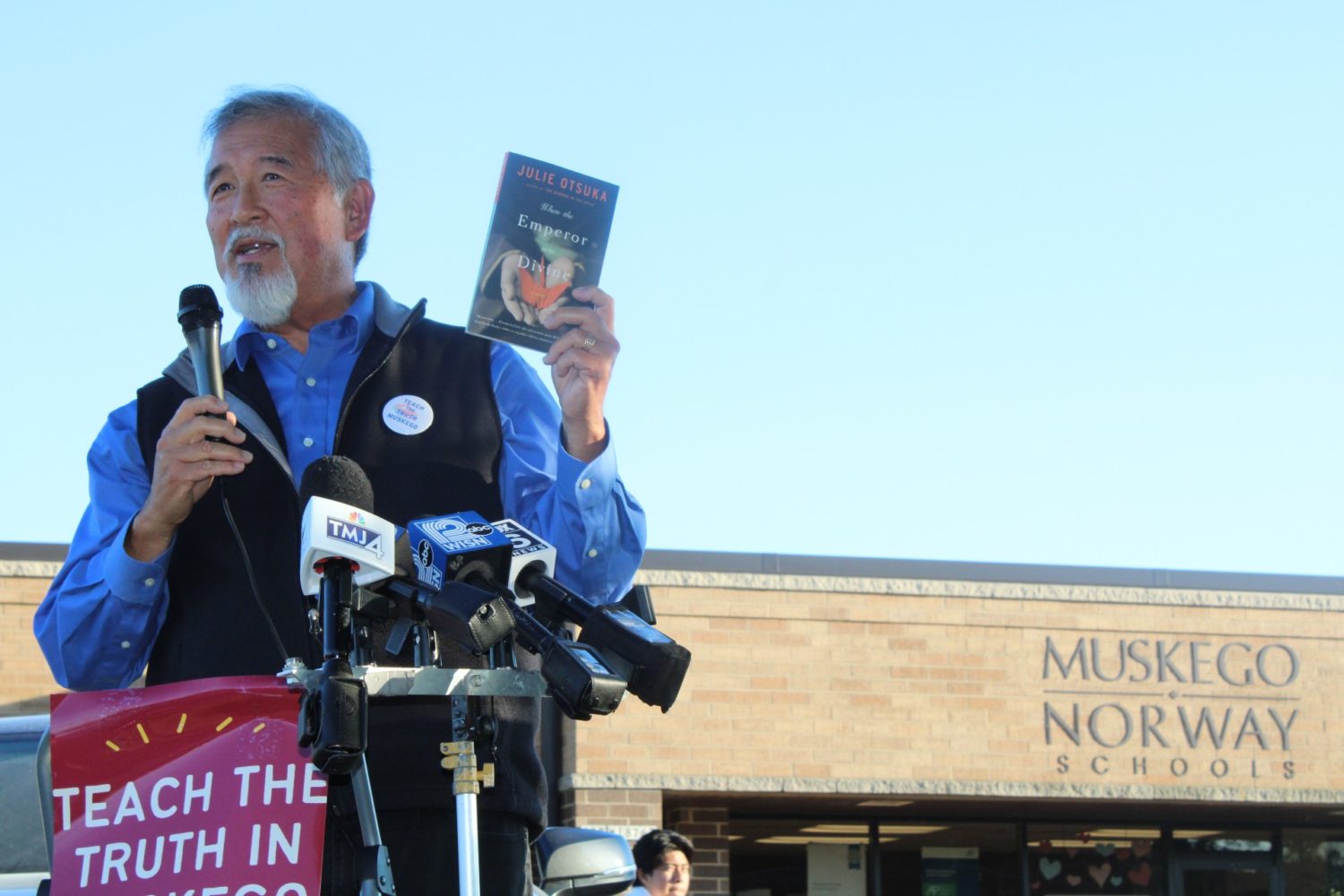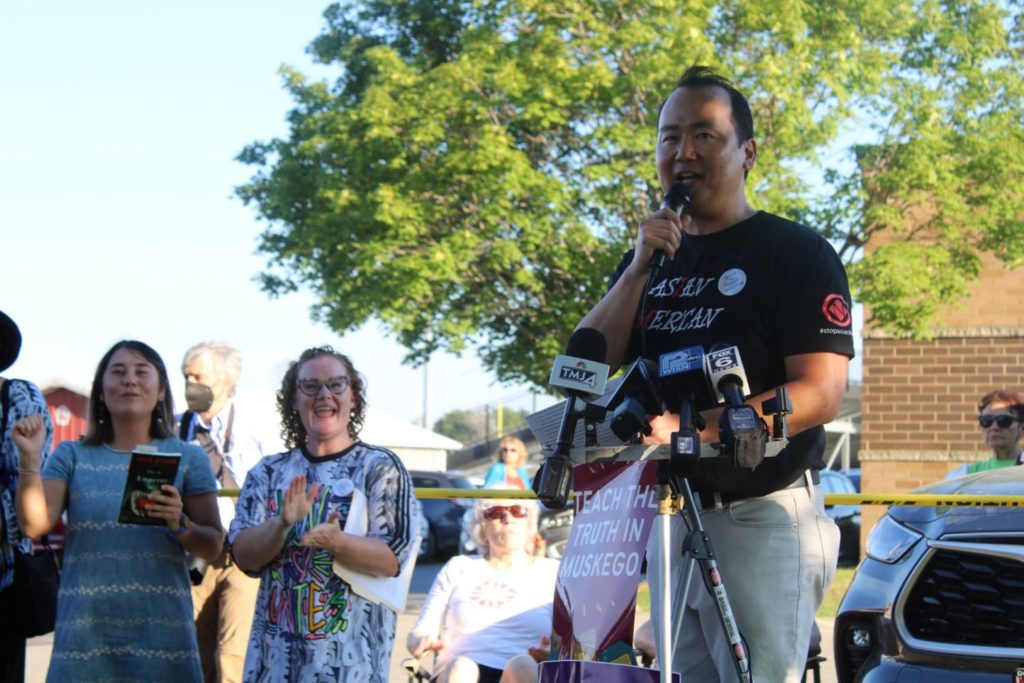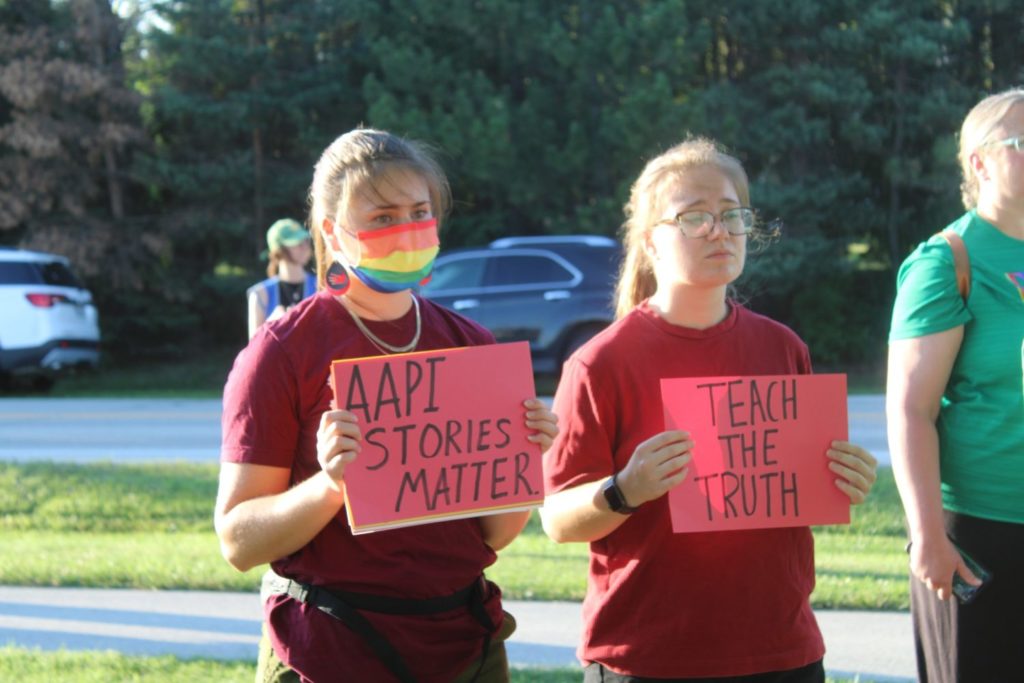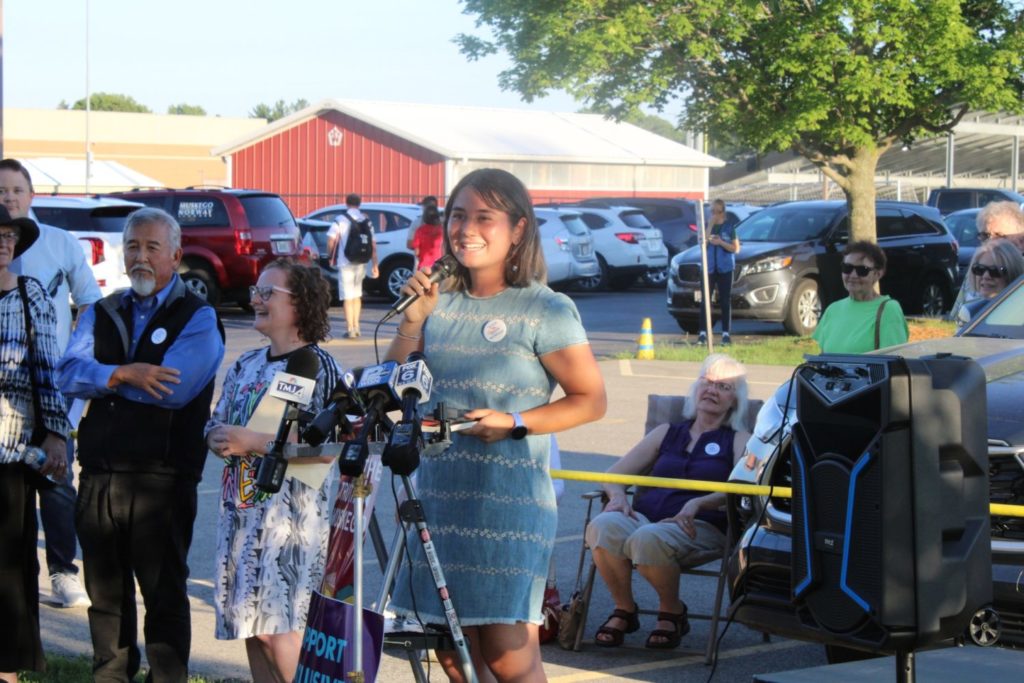
About 100 people turned out in Muskego Monday evening outside the Muskego-Norway School Board meeting to protest the exclusion of a novel about Japanese American incarceration from the English curriculum.
“We are here to stand together and to let the board know that we will not stand for racism, exclusion, erasure, or whitewashing of our history,” said Anne Zielke, a parent who brought the issue to light. “We are here to stand up against the overtly racist anti-diversity fervor that got some of our current board members elected and feeds decisions like these.”
At issue is the novel When the Emperor Was Divine by Julie Otsuko. Published in 2002, it tells the story of American citizens from California forced to abandon their lives to be falsely incarcerated during the Second World War.
Ron Kuramoto, president of the Wisconsin Chapter of the Japanese American Citizens Alliance, said the novel accurately reflects the experience of many of his family members who were incarcerated.
“I’m hearing that the school board here in Muskego is telling you not to read this book. And I’m telling you that there are some good reasons to read it,” he said. “This is a fictional work. This is not untrue.”
Board members have not spoken publicly about the decision, but Zielke’s detailed notes of the June 13 meeting indicate the committee did not give clear reasons for the book’s not being approved, other than one member not liking it and another saying it had been chosen because it was “diverse.”
Zielke told other media outlets that in subsequent conversations, board members said the book didn’t provide “balance” or “the American perspective.”
Kabby Hong, the 2022 Wisconsin Teacher of the Year, a member of the Asian American Pacific Islander Coalition of Wisconsin, and an English teacher at Verona High School, said the district should trust its teachers, who chose the book for an advanced English class meant to prepare students for Advanced Placement Literature.

“(As a teacher,) you’re constantly looking at your books, you’re constantly looking at your curriculum, and you’re trying to do the best for your kids. And these English teachers here in Muskego did exactly that,” Hong said. “They look for months for a book that would work well to help prepare their students for AP English … And what’s interesting is that the teachers approached the board with their professional recommendation. And unfortunately, the board rejected it…. I’m here to say, as a fellow educator to all Muskego teachers out there that I see you, I hear you and I value you.”
“I am still receiving contradictory information from different members of the board as to why exactly this book is being sent back for further review and committee,” said Lawrence Hapeman, a 2021 graduate of Muskego High School who wrote a petition urging the board to allow the novel into the curriculum. Hapeman said he’s heard both that committee members didn’t like the book (“The school board does not exist to give educational materials ratings on a five star scale, but rather work with the knowledge and experience of educators who are teaching these courses every day during the school year,” he said) and that choosing a book by an author of color somehow violates the district’s anti-discrimination policy.
A lack of transparency in the decision-making process was also a concern for 2021 graduate Lilly Tatannia.
“While we are here today to discuss this one text, it is so much bigger than that,” she said. “It is so much more dangerous than that. Allowing our school board to perpetuate the sneaky behavior and make decisions without public knowledge or open statements will only open the door to a slippery slope of deception.”

“The comment that opened up an old wound, for me and so many Asian Americans, is a comment that this book, written by a Japanese American author, chronicling the lives of Japanese Americans in California did not present the American perspective. That was so painful to read,” Hong said. “The board’s decision shows a severe lack of understanding not just for the lived experiences of Asian Americans, but also for American history. Asian American history is American history.”
The event, referred to by organizers as a “teach-in,” took place outside the school board meeting because the board refused to allow the public to speak on the issue at the board meeting.
Hong said he was “blown away” by the turnout.
“It shows really the love that this community has for its teachers for public education. And they really care about this issue, so it’s just incredibly heartwarming to see the turnout tonight,” he said.
“It’s so good to see so many young people here too, because they are the future and they see how democracy really works,” said Peng Her, CEO of the Hmong Institute and Democratic candidate for Lieutenant Governor. “Making sure that we can hold public officials accountable for making decisions. They think that they’re smarter than teachers, as well as trying to whitewash our Asian American history.”
Asian American Pacific Islander Coalition Education Committee Co-chair MJ Wong Engel said the organization is pushing for legislation that would require Asian American history in schools. A bill to amend Act 31, which requires the teaching of Indigenous, Black and Latino history, to include Asian American history is currently languishing in committee.

“We started this campaign for two reasons. One, we have witnessed and we have experienced anti Asian hate and violence increased since the COVID 19 pandemic began,” she said. “And two, we know all of us here know that education is our most powerful tool for combating hate, and promoting empathy and understanding.”
Her said such education is important becuase “it’s also important to recognize that the Asian American community isn’t just one monolithic community. It’s Hmong, Cambodian, Lao, Japanese, Chinese. And so there’s many, many of us, and each one of us has our own culture, language. It’s important for the larger committee to understand that.”
In a statement to CBS58, the Curriculum Planning Committee said the full board had not considered the book and had therefore not denied it, but rather the Curriculum Planning Committee had requested that it go through the staff committee process again. A timeline of that process is not clear.
In a statement emailed to Madison365, the book’s author, Julie Otsuko, wrote, “Of course I’m deeply disappointed by the school board’s decision. But at the same time I’m heartened by all the parents and students in Muskego who came out in opposition to the ban. I don’t want this to get lost in the coverage. To see a community rally around a book because they believe the truth must be told—that gives me hope. Given the level of hatred that so many Asian Americans are experiencing in this current moment, it is more important than ever that students learn about our country’s racist past, and that the legacy of the Japanese American incarceration not be forgotten. Especially now, when, with each passing day, more and more survivors of the camps are leaving us behind.”



